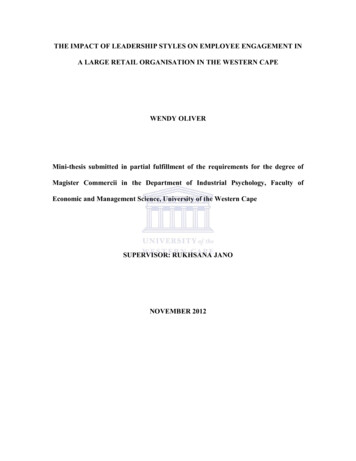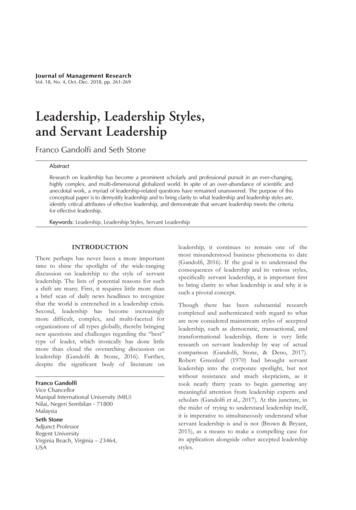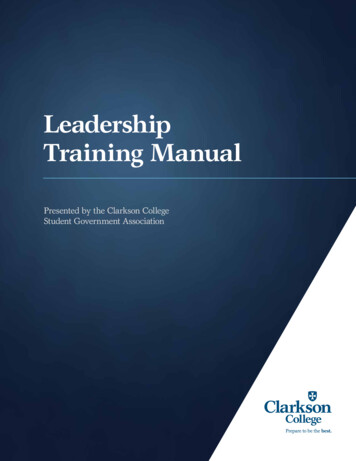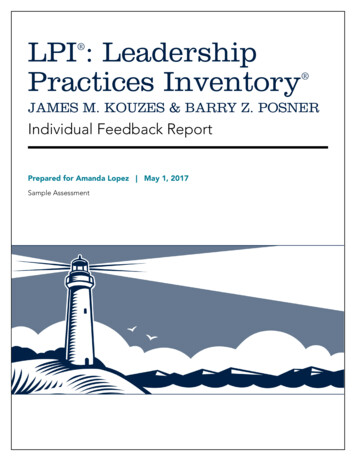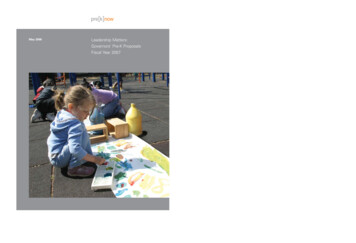
Transcription
2661 Leadership Rept 06 v7.qxdMay 20064/27/067:43 PMPage 1Leadership Matters:Governors’ Pre-K ProposalsFiscal Year 2007
2661 Leadership Rept 06 v7.qxd4/27/067:43 PMPage 2et, NW1025 F StreSuite 900DCWashington,20004Pre-K Now71 voice202.862.9870 fax202.862.98ow.orgwww.preknMay 2006gare embracinever beforeanthrnorssveeradgole2006 moreThis year, 23.inesatatthstsrweineto increaseform in thto share theve proposededucation rehain–I am proudep06stYtFrstion andfour fromrten as the fiacross the naumbia – upomolfrCpre-kindergailofhatsictrorar 2007governor of the Disposals Fiscal Yercent. Theseand the mayage of 25 pers’ Pre-K ProernoaversibleovonanGsp:byrsregpolicy,rship Mattepre-k fundind economicuntrum. Leadesoecsptoaltsicenlitmmitmacross the pos for their coildren.ese governorthesr nation’s chizougnrcofosreretufuerwell as their, and bettaddresses aseschool reformatstofosals.eattheir st’s pre-k propn words froms in this yearowhts’ligorwrnelovethdleaders,high- anlooks to goe reveal theing you theThis reportsnapshots, witiatives to brlincaylodlicanpodgionalbudgets anpicture to reoad, nationalss.neerildFrom the brin the wmanyd those lostar ago, andfollowers, aney were a yethanthr pre-k.sfoone projectiexpansionsements andbetter revenuovrprfaimngdcitefaecedenors aretoward unprMost governvocacyllars to workdoeosthslative and adgare puttinut pre-k legircdeountainMundto,anern Plainsd or, worseelthfioreNthegthlaue tornors iniling toever, continunt. Six govellars while faOthers, howillions of dothem to accomllsofcaing rapidly,dsrtowrepothis rein the hundre pre-k is grshesewlusefforts, andrpess.onsugidgetre, in reand life succticipating bue-k. Elsewhendergartenprkiyrlitfostates are anuaon-qtir highl foundae funding foren this vitaprovide statrefuse childtouetheinntcornorspre-k, and, ascertain govesentiment onicissue.bleputhtsoneciatives reflleadershipitrineilthiagorinatutrnsupport forors are toealth of gubelming voterbent governhemwcuerThis year’s winovtgarin, smshowon heats uppoll numberselection seasmotivated bysapme.rhtitperss,fiork for theSome governg about preinlktaevite all ourarion,t, and we inenemearly educatovmeation.ar for thsuccessful yeation in educal transformd to anotheronartirwarrive atnafonesreblokildlois remarkad when chthaninPre-K Now,eenatrtipicgar kinderrnors to partes children fonation’s govepre-k prepare:plmsiisfit.Our messagen, we all beneready to learenrtgaerndkiue:Dear Colleagtt, Ph.D.Libby DoggeirectorExecutive DPre-K Now
2661 Leadership Rept 06 v7.qxd4/27/067:43 PMPage 3Leadership Matters:Governors’ Pre-K ProposalsFiscal Year 2007Across the country, governors are recognizinghigh-quality, voluntary pre-kindergarten asa proven school-reform strategy. This year,24 leaders prioritized this effort by proposingincreased funding to expand and enhancetheir states’ pre-k programs. These investmentspromise to improve both K-12 systems andchildren’s opportunities for success in kindergartenand in life.This report reviews the state of the stateaddresses and proposed budgets of ournation’s governors and the mayor of theDistrict of Columbia to assess their individualcommitments to high-quality pre-k for all.
2661 Leadership Rept 06 v7.qxd4/27/067:43 PMPage 4IntroductionNew LeadersIn states across the nation, smart governors, Republicanand Democrat alike, ushered in 2006 with boldleadership in the movement for high-quality, voluntarypre-kindergarten for all. This year, 24 governors – ascompared with 17 in 2005 – named early educationas a priority in their state of the state addresses, andmost backed their rhetoric with pre-k funding increases,totaling nearly 250 million. These leaders understandthat when children arrive prepared for kindergarten,public schools, state economies, and, most importantly,children benefit.Every year, more governors recognize the wisdom ofstate investment in pre-k. In 2006, three state executivesstand out for their new pre-k commitments.These gubernatorial commitments were bolstered bya welcome trend: favorable state-revenue forecasts.Forty-eight of the 50 states are likely to enjoy stableor growing incomes for the remainder of FY06.1As this year’s midterm elections gear up, research showsthat voters overwhelmingly support state funding forpre-k and the growing numbers of policymakers whochampion it,2 facts that promise to enlist and elect stillmore committed pre-k leaders.With Leadership Matters, Pre-K Now examines thepre-k proposals of governors around the country.We commend the innovative and tenacious and exposethe intransigent and uninspired. This year, we beginwith three governors who have stepped up to lead theirstates on pre-k.Kentucky Gov. Ernie Fletcher (R)Much of a child’s future successdepends on those first years.An investment here will givestudents, who may be at risk offalling behind, renewed hope.2 Leadership Matters: Governors’ Pre-K Proposals Fiscal Year 2007Kentucky: Governor Ernie Fletcher (R) recommended a 46 percent increase of 23.5 million forthe Kentucky Preschool Program. In his state of thestate remarks, Governor Fletcher offered a succinctexplanation of his stance on pre-k, noting that thisnew commitment is part of “ a series of steps tomake us more competitive globally and with oursouthern neighbors. And basic to getting competitiveis improving education .”3Michigan: Governor Jennifer Granholm (D)proposed an increase for the Michigan School ReadinessProgram of 28.7 million, which will fund servicesfor 8,000 additional children. Emphasizing her pre-kcommitment, Governor Granholm said in her stateof the state address, “We know that the biggestopportunity to secure your baby’s success later inlife comes early – before your little one even enterskindergarten.” 4Washington: Governor Christine Gregoire (D) isproposing an FY07 increase of over 2.2 million forher state’s Early Childhood Education and AssistanceProgram, raising total funding to just over 31 million.Additionally, in February, she won bipartisan passagein the legislature for a new cabinet-level Departmentof Early Learning. In her state of the state address,Governor Gregoire explained the importance of theseinitiatives. “We need to stop falling behind the rest ofthe country. We need to make sure our children areready to learn when they hit kindergarten.” 5 By prioritizing governance, she has laid a solid foundation forexpanding early learning in Washington.
2661 Leadership Rept 06 v7.qxd4/27/067:43 PMPage 5Governors’ ProposedInvestments in Pre-KProposed Increased Investment in Pre-KPre-K Funding through School Funding FormulaProposed Flat Investment in Pre-KProposed Decreased Investment in Pre-KNo State Pre-K ProgramThis map illustrates the proposals for pre-k investmentmade by all 50 governors and the mayor of the District ofColumbia and reveals several notable trends. First and mostimportantly, is the broad support, nationwide, for high-qualitypre-k. Increases outpaced flat or decreased funding in thisyear’s gubernatorial budget recommendations by more thantwo to one. Regionally, the South continues to be thenation’s leading pre-k region, even in Louisiana where thesmall decrease is a win for pre-k in the wake of last year’shurricanes. In contrast, the Northern Plains and Mountainstates remain a pre-k wilderness. Another important trend isthe inclusion of pre-k in state school funding formulas. Thisstrategy is the best approach to formalizing pre-k’s positionas a core component of public education.Leadership Matters: Governors’ Pre-K Proposals Fiscal Year 20073
2661 Leadership Rept 06 v7.qxd4/27/067:43 PMPage 6The Pre-K VanguardReturning ChampionsPre-K Now has identified four governors whoseenduring commitments, bold policies, and records ofsuccess in building and growing high-quality programsset the gold standard in pre-k leadership.In 2005, Pre-K Now named five governors as “NewLeaders” on pre-k. Of these, three have continuedtheir efforts and are earning a place among the pre-kelite; one has regrettably chosen not to build on lastyear’s gains; and one is bravely using pre-k to helpcombat the impacts of one of the most devastatingnatural disasters in our nation’s history:Illinois: Governor Rod Blagojevich (D) has proposedannual increases of 45 million for each of the nextthree years for early childhood, including 40 millionfor high-quality pre-k and five million dollars toexpand services to at-risk children from birth to agethree. This initiative has established GovernorBlagojevich as the nation’s premier pre-k champion,and should, eventually, make Illinois the first statein the nation to offer voluntary pre-k to every threeand four year old.Connecticut: Governor M. Jodi Rell (R) is proposing a midterm budget adjustment of four millionadditional dollars to expand pre-k access. She alsoissued an executive order to create a state EarlyChildhood Research and Policy Council, which willexplore strategies for future expansions.North Carolina: Governor Mike Easley (D) isproposing an 19 percent FY07 increase for thestate’s high-quality pre-k program, More at Four.The increase will likely be funded through NorthCarolina’s new education lottery, which GovernorEasley championed last year.Pennsylvania: Governor Ed Rendell (D) recommended a 50 percent, 15 million increase in fundingfor Head Start that will serve 1,540 new children.The governor also proposed an increase of 50 millionfor the state’s Accountability Grants program, whichfunds a variety of educational services including pre-k.Governor Rendell’s FY07 pre-k proposals are bolsteredby a recent report documenting substantial returns,both financial and educational, on Pennsylvania’s earlyeducation investment.64 Leadership Matters: Governors’ Pre-K Proposals Fiscal Year 2007Iowa: Governor Tom Vilsack (D) has recommendedadding a new pre-k program called Strong Start withinitial funding of 15 million. The program would befinanced through the state’s school funding formula.His 2005 pre-k proposals met staunch resistance in thelegislature, and this year promises another tough fight.New Mexico: Governor Bill Richardson (D) hasproposed an increase of 228 percent for New MexicoPre-K, including 10 million in recurring funds.The state program was established in 2005 aftera legislative struggle. With this year’s budgetrecommendation, the governor is seeking to expandupon last year’s hard-won gains.Tennessee: Governor Phil Bredesen (D) proposeda 57 percent increase for the Voluntary Pre-K forTennessee program, which, thanks largely to thegovernor’s inclusive, bipartisan approach in 2005,is poised to win broad support.Table 1: Pre-K AccoladesTop Five Proposed Increases for FY07StateNew l RichardsonTom VilsackPhil BredesenEd RendellErnie FletcherPercentage Increase228%133%57%50%45%
2661 Leadership Rept 06 v7.qxd4/27/067:43 PMPage 7Hawaii: Governor Linda Lingle (R) proposed flatfunding for her state’s Open Doors pre-k program.This year, her administration plans to focus on qualityimprovements. Unfortunately, the governor missed akey opportunity to sell that effort to legislators andthe public by failing to mention the issue in her stateof the state address.Louisiana: Governor Kathleen Blanco (D) haspinpointed pre-k as a priority program for the state’srecovery from Hurricanes Katrina and Rita. Despitereduced demand, resulting from large-scale relocations,and the widespread loss of schools, pre-k centers,and teachers, the governor has proposed to fund thehigh-quality LA4 pre-k program at only 2 millionbelow its FY06 operational budget.Pre-K Quality CountsAnnual increases are important to the improvement of everypre-k system, but just as important is how those dollarsare spent. Individual governors, legislators, and educatorsmust evaluate the specific needs of their state’s systemwhen establishing spending priorities. In this process, therush to expand access has sometimes overshadowed thedevelopment of high-quality programs. More recently,leaders have recognized that pre-k’s effectiveness dependsupon high quality standards, especially small class sizes, lowteacher-child ratios, and rigorous qualifications for teachersand instructional aides.7few NIEER benchmarks. However, that figure reflects thestate’s former early education system, not New MexicoPre-K, which was launched in 2005-06 and features highquality standards and an ambitious professional-developmentprogram. In 2007, NIEER will provide its first evaluation ofthis new program and should find significantly higher quality.In Iowa, however, pre-k remains mired in mediocrity.Table 2: Program Quality in States withLargest Proposed IncreasesIn their annual review of state pre-k systems, the NationalInstitute for Early Education Research (NIEER) found that, in2004-05, 12 states had pre-k programs that met eight ormore of 10 quality benchmarks, compared with only fivestates four years ago. Arkansas is still the only state witha program that meets all 10. In contrast, 19 states hadprograms that met five or fewer benchmarks in 2004-05.8StateTable 2 shows the five states with the greatest proposedincreased investment for FY07 and their average programquality according to the NIEER criteria. Currently, only two,Tennessee and Kentucky, offer high-quality programs.Pennsylvania met fewer than three of NIEER’s qualitybenchmarks, but late last year, the state took the criticalstep of establishing broad new quality standards for itspre-k program. These standards are expected to go intoeffect in the 2006-07 school year and should generate rapidimprovement. New Mexico’s pre-k program also met only aSource: W. Steven Barnett, Hustedt, Jason T., Robin, Kenneth B., andSchulman, Karen L., The State of Preschool: 2005 State PreschoolYearbook (New Brunswick: Rutgers, The State University of New Jersey,2006), 222. eeKentuckyIowaNew MexicoPennsylvaniaNIEERBenchmarks9854*2.5‡BA Degree Requiredin all SettingsYesYesNoNo**No* This figure represents the quality of New Mexico’s former earlyeducation system and is not reflective of New Mexico Pre-K,which launched in 2005.** New Mexico Pre-K is in the second year of a five-year phase-inplan for a BA requirement.‡ This figure is for the 2004-05 school year. In December 2005,Pennsylvania instituted new quality standards, which Pre-K Nowexpects will produce quick and substantial improvement.Leadership Matters: Governors’ Pre-K Proposals Fiscal Year 20075
2661 Leadership Rept 06 v7.qxd4/27/067:43 PMPage 8Pound FoolishThree governors, whose states are expected to showincreased revenues in FY07, opted not to invest any ofthose new dollars in pre-k. In Alabama, Florida, andNew York, current pre-k expenditures already fall wellshort of what is needed by the children and families inthese states. Unfortunately, these governors are passing up the rare opportunity to convert present revenuegrowth into long-term prosperity by investing in pre-k,an effective, fiscally responsible, school-reform strategy.Alabama: Governor Bob Riley (R) had the meansto significantly improve and expand pre-k in FY07.As the governor noted in his state of the state address,“We are spending more on education than everbefore. 1 billion more with record amounts goinginto our classrooms.”9 However, even with such substantial dollars available, the governor chose only toconvert last year’s 1 million conditional appropriationfor pre-k into a recurring allocation. While thetransition of dollars from conditional to permanentis an important step, his unwillingness to allot newdollars for pre-k signals a resistance to the evidenceof pre-k’s benefits acknowledged for years by otherSouthern leaders.6 Leadership Matters: Governors’ Pre-K Proposals Fiscal Year 2007New York: Governor George Pataki (R) is operatingunder a nine-year-old pre-k-for-all legislative mandate.For Governor Pataki, however, disregard for the state’spre-k system is an entrenched policy dating to 2001.Despite optimistic revenue forecasts for FY07, thegovernor’s budget recommended continued flatfunding. In April, the legislature sent a final budgetto the governor, which rejected his proposal andinstead increased state pre-k funding by 50 million.Under pressure from advocates and legislators,Governor Pataki acquiesced and enacted the newpre-k appropriation.Florida: Governor Jeb Bush (R) is also required bylaw to provide pre-k for all. His state’s fledgling programsuffers from poor quality standards and lower-thanexpected participation rates. Unfortunately, ratherthan tapping growing revenues to truly addressthese problems, Governor Bush has proposed only a.04 percent increase, which will raise the per-childappropriation by a paltry 140 – not nearly enoughto measurably improve program quality.
2661 Leadership Rept 06 v7.qxd4/27/067:43 PMPage 9Empty RhetoricThis year, three governors distinguished themselves bytheir disingenuous statements on pre-k. Consequently,Missouri and South Carolina may face another yearwithout adequate pre-k funding or needed leadership.While in Vermont, spurious accusations and politicalfinger pointing are putting high-quality pre-k in realjeopardy.more money.”11 With South Carolina in strong fiscalshape and pre-k a proven education-reform measure,Governor Sanford has options beyond new taxes orreliance on the private sector. His abdication leavesone wondering which programs – or for that matter,which outcomes – this early learning proponent wouldembrace.Missouri: Governor Matt Blunt (R), in his state ofthe state address, noted, “Learning does not begin inkindergarten” and identified education from pre-k tocollege as “the number one fiscal priority of stategovernment.” He went so far as to state that, “At ayoung age, children’s minds are eager to learn, and asa state we should look for opportunities to foster thatdesire for knowledge.”10 However, this proved merepandering. In his FY07 budget, Governor Blunt flatfunded the Missouri Preschool Project (MPP). This year,Missouri early learning advocates will have to fightonce again to preserve the state’s small and vulnerablepre-k program. Governor Blunt has made clear hisunderstanding that pre-k is crucial to children’sschool and life success; so his choice to flat fundearly education seems to signal his indifference.Vermont: Governor James Douglas (R) proposedremoving pre-k from the state’s school fundingformula into which it was folded just two years ago.In his 2006 state of the state address, GovernorDouglas asked members of the general assembly to“reconsider the decision” to include pre-k in theschool funding formula and to decline to “furtherincrease the cost of education and the growing tax billsthat accompany those costs.”12 Rather than celebratingthe benefits of this educationally savvy approach topre-k funding, Governor Douglas is callously exploitingchildren’s futures to instigate citizens’ tax fears.South Carolina: Governor Mark Sanford (R)delivered his state of the state address in the shadowof a December 2005 South Carolina circuit courtdecision that mandated expansion of state-fundedpre-k. In response to the court ruling, the governorfirst pronounced himself “a proponent of earlychildhood education” and then proceeded to all butflat fund the state program, pawning the bulk of theresponsibility off on “the private sector’s capacity.” Hewent on to say that the state should “focus [its] finiteresources to the programs that produce the bestoutcomes before going to the taxpayer asking forLeadership Matters: Governors’ Pre-K Proposals Fiscal Year 20077
2661 Leadership Rept 06 v7.qxd4/27/067:43 PMPage 10The Pre-K WildernessOf the 10 states that still offer no state-funded pre-k,six have FY07 revenue projections that are among themost positive in the nation, while only one, RhodeIsland, is facing a tough fiscal future.13 These windfallshave inspired many elaborate new budgetary proposals,but none includes building children’s futures throughhigh-quality pre-k. In each case, the cost of such aprogram would be a fraction of available funds butwould pay dividends for decades to come.On the current governors’ watch, more than350,000 children in the 10 states that comprise thepre-k wilderness have been deprived of opportunitiesafforded to many children in other states.Idaho: Governor Dirk Kempthorne (R), since 1999,has presided over the denial of this critical educationalservice to more than 90,000 young children.Montana Governor Brian Schweitzer (D),New Hampshire Governor John Lynch (D),Utah Governor Jon Huntsman (R), andIndiana Governor Mitch Daniels (R) were all firstyear governors in 2005. In a single year, these fourstate executives have fated nearly 140,000 children toenter kindergarten without the strong foundation ofhigh-quality pre-k.Iowa Gov. Tom Vilsack (D)The future will be challenging,and if we finish the good work westarted in early childhoodeducation our children will beprepared for that challenging future.8 Leadership Matters: Governors’ Pre-K Proposals Fiscal Year 2007The pre-k wilderness is not merely an educationalcondition. In fact, many of these states are largelyrural. According to a recent study, “Rural childrenare 60 percent more likely than non-rural childrento be placed in special education in kindergarten.”14Research has consistently shown that high-qualitypre-k reduces the number of special educationplacements.15 Such findings serve to underscoreboth the urgent need for pre-k in these states andthe scope of the gubernatorial negligence.However, not all the news in these states is bad.This year did offer reason for hope in two pre-kwilderness states:South Dakota: Governor Mike Rounds (R) failedto mention pre-k in his state of the state address, butin a series of January press conferences, he announcedthe 2010 Education Initiative, which includes a pre-kcomponent called Starting Strong. Under the plan, inFY08, he will pursue the legislative authority to designa pre-k system for four year olds not served by HeadStart or Title I, and funding for the program wouldbegin in FY09.Wyoming: Governor Dave Freudenthal (D)discussed pre-k extensively in his state of the stateaddress, noting that early childhood education was“the top priority recommendation” of a two-yearstudy by “citizens, legislative committees, andprofessionals in the field,” and arguing that “if wedo nothing, our grandchildren will live in a societyof neglected children and struggling families.”16With these remarks, the governor continued his longrunning efforts to persuade a resistant legislature ofthe importance of pre-k and to secure support for amodest early education system.Pre-K Now hopes that these proposals and the neededfunding will be realized so that children in Wyomingand South Dakota can begin to emerge from the pre-kwilderness.
2661 Leadership Rept 06 v7.qxd4/27/067:43 PMPage 11Figure 1: Wilderness State Children Left BehindStateGovernorYears in OfficeMontanaBrian Schweitzer17,800WyomingDave Freudenthal312,600South DakotaMike Rounds320,400North DakotaJohn Hoeven525,000Rhode IslandDon Carcieri428,200New HampshireJohn Lynch132,800UtahJon Huntsman132,800MississippiHaley Barbour244,600IndianaMitch Daniels166,000IdahoDirk Kempthorne791,200According to U.S. Census and individual state data, duringthe current governors’ tenures, 361,400 four year oldsin the 10 pre-k wilderness states have entered kindergartenwithout the benefit of a high-quality, state-funded pre-keducation.Number of Four Year Olds Left BehindSource: Various federal, state, and independent reports.17Full-Day KindergartenThis year, both Governor Ruth Ann Minner (D) of Delawareand Governor Janet Napolitano (D) of Arizona recommendedsubstantial new funding to provide full-day kindergarten.These proposals demonstrate a clear understanding on thepart of both governors that early learning provides a criticalfoundation for children’s school and life success. Full-daykindergarten is an important ingredient in early childhoodeducation, but it can only be fully effective if children arriveprepared to make the most of the opportunity. In Delaware,this full-day kindergarten proposal was accompanied by aslight increase in funding for pre-k. In Arizona, early learningadvocates are now campaigning for a November 2006 ballotinitiative that will generate new tobacco tax revenue,earmarked for early childhood services including pre-k.Leadership Matters: Governors’ Pre-K Proposals Fiscal Year 20079
2661 Leadership Rept 06 v7.qxd4/27/067:43 PMPage 12Pre-K on theCampaign TrailConclusionAccording to a recent poll, 84 percent of voters believethat pre-k prepares children to succeed in school andshould be a priority investment.18 Given these findings,it’s hardly surprising that candidates are increasinglyviewing support for pre-k as a winning campaign strategy.Nationwide, pre-k is proving a winning strategyfor governors, both in the polls and at them. Moreimportantly, it is a proven strategy for bettering statebudgets, public education systems, and children’s lives.This year, politically astute and financially and sociallyresponsible governors around the country are tappinggrowing revenues to establish, expand, and improvehigh-quality state pre-k programs. A few governorshave not yet recognized the broad public support forpre-k, a political miscalculation they may come toregret. Only 10 states still offer no such services, andsadly, the majority of their governors, even whileenjoying some of the nation’s best fiscal outlooks, havenot seen fit to champion pre-k. Each of these states isjust one leader – just one visionary governor – awayfrom a brighter future. With this report, Pre-K Nowhopes to inspire new, bold leadership to make thepromise of pre-k a reality for thousands more childrenin years to come.Twenty-six of this year’s 36 gubernatorial racesinclude incumbent candidates. Of these incumbents,15 mentioned pre-k in their state of the state addresses;although some of these have yet to back up their wordswith substantive proposals to support pre-k. Only twoof the incumbents are from states with no pre-k programs. While both of these governors have remainedsilent on the issue, their major opponents are findingthat support for pre-k is important to their campaigns.In 2005, pre-k figured prominently in one state’s off-yeargubernatorial race. Virginia Governor Tim Kaine (D)won his election campaigning on pre-k. During hiscampaign, Governor Kaine proposed Start Strong, apre-k-for-all initiative. The high level of public supportfor pre-k fueled Governor Kaine’s initiative; 81 percentof Virginia voters rate expanding access to high-qualitypre-k as important.19 For FY07, Governor Kaine inherited the biennium budget proposed by his predecessor,Mark Warner, and as a result has offered no fundingfor the program this year. The governor has indicatedthat he will seek a 74 million inaugural investment forStart Strong in FY08, followed by annual increasestoward a total appropriation of 300 million per year.Also this year, 10 states and the District of Columbiahave open races for their chief executives. In theseraces, with no incumbents to cite a pre-k record, candidates have the opportunity to embrace this popularpolicy from the start. A number of the candidates inthese races are already on record in support of pre-k.Pre-K Now encourages all this year’s candidates todeclare their support for this essential program, and wehope, in 2007, to be featuring many more executives asbold leaders in the national movement for high-quality,voluntary pre-k for all.10 Leadership Matters: Governors’ Pre-K Proposals Fiscal Year 2007Virginia Gov. Tim Kaine (D)We know that most of a child’sbrain develops before the age offive. But nearly all of the moneywe now spend on education isspent after that point.
2661 Leadership Rept 06 v7.qxd4/27/067:43 PMPage 13Governors’ State of the State Addressesand FY07 Budget Proposals for Pre-KThis chart documents proposed pre-k investment ingovernors’ budgets in all 50 states and the District ofColumbia. It compares FY06 final appropriations withgovernors’ recommendations for FY07. In addition,the chart notes if governors mentioned pre-k or earlyeducation in their state of the state addresses.State, Governor, &Proposed Percent ChangeState of the StateMentions Pre-K orEarly EducationProposalAlabamaNoIncreased investment in the School Readiness Programfrom 3.30 million to 4.36 million by making permanentlast year’s 1.1 million conditional appropriation.NoNegligibly increased state funding for Head Start from 6.330 million to 6.338 million with a cost of livingadjustment to maintain the same level of service.Also proposed 750,000 for the Early Learning Task Force.YesFlat funded the Early Childhood State Block Grant, of whichschool districts spent an estimated 12 million on pre-k inFY06. Recommended a significant increase of 105.4 millionfor full-day kindergarten. Advocates are campaigning for aNovember 2006 ballot initiative to increase the cigarette taxby .80 per pack to fund various early childhood servicesincluding pre-k.Gov. Bob Riley (R) 32%AlaskaGov. Frank Murkowski (R) 0.1%ArizonaGov. Janet Napolitano (D)0%Leadership Matters: Governors’ Pre-K Proposals Fiscal Year 2007 11
2661 Leadership Rept 06 v7.qxd4/27/067:43 PMPage 14State, Governor, &Proposed Percent ChangeState of the StateMentions Pre-K orEarly EducationProposalArkansasDid not give astate of the stateaddress in 2006Flat funded the Arkansas Better Chance program at 71.2 million, the level of the legislature’s FY06 appropriation.NoIncreased the State Preschool Program from 347 millionto 369 million with cost-of-living and growth adjustments tomaintain the current level of service.NoIncreased the Preschool Program from 33.18 millionto 33.95 million.YesIncreased the School Readiness Initiative from 62.1 millionto 66.1 million to serve 500 additional children and to makeexpansion grants available. Also established, by executiveorder, the Early Childhood Research and Polic
ashington, DC 20004 202.862.9871 voice 202.862.9870 fax.org 2661_Leadership_Rept_06_v7.qxd 4/27/06 7:43 PM Page 2. Leadership Matters: Governors' Pre-K Proposals . the Kentucky Preschool Program. In his state of the state remarks, Governor Fletcher offered a succinct explanation of his stance on pre-k, noting that this


